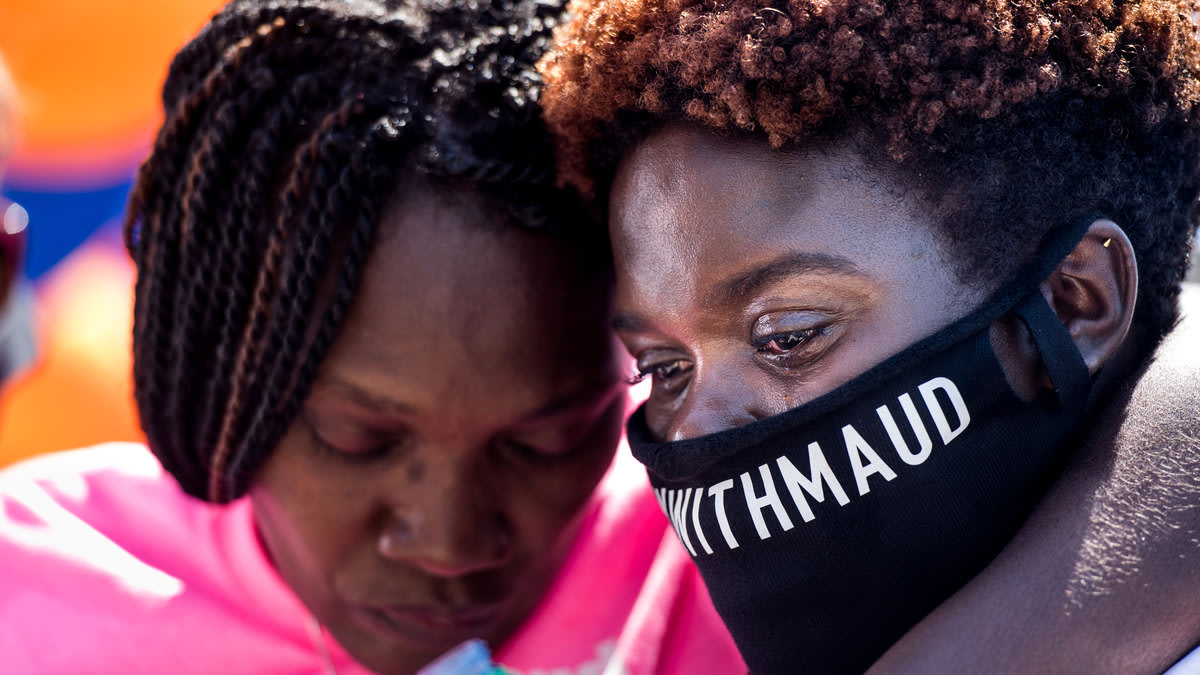The trial of the three men accused of slaying Ahmaud Arbery has Black Americans walking on pins and needles once again. Whatever the jury decides, I’m afraid, will fail to address a damming question that the tragic incident symbolizes: How can Black people ever be secure in America?
Executed by three strangers while jogging in a white neighborhood, Arbery’s killing reflects the mindset of domination in the culture of white supremacy: the belief that any random white person has the right to accost and detain a Black person with impunity. Authorities are ready to accept their claims of righteous endangerment–even when they are the instigators of the danger.
Yet, the Arbery encounter is just the latest in a series of violent racial incidents that linger in memory: George Floyd, Trayvon Martin, Tamir Rice, Breonna Taylor, Eric Garner, and so many others. The fatal consequences are recounted on television and social media and trigger episodes of post-traumatic stress in the Black psyche.
Add to these graphic executions the racism inherent in the criminal justice system, and the increasingly unstable antics of states under the spell of Trumpism, and one can wonder if it is time for Black Americans to consider establishing a base for security?
Such a conclusion runs counter to the direction of Black politics since the Supreme Court decision in the school desegregation cases. After the NAACP emerged victorious in Brown v. Board of Education, Black leaders embraced the illusion of integration even if it meant taking a beating. To be fair, the notion to “redeem the soul of America” from its legacy of slavery and Jim Crow had successes and failures.
Nearly 70 years later, after generations of racial strife, the climate today suggests that new options may be worth pursuing. In this new century, Black thinkers may want to weigh the merits of establishing a majority-minority state as a political base while still demanding the rights of citizenship across the land.
I do not make the suggestion lightly because I know the anxiety that “self-determination” schemes can trigger—does it mean a return to “separate but equal?” The question, however, ignores the reality that for many the separate status never ended or did so at a loss of culture.
A project to create a Black-majority state would be in the political and cultural interests of the race. There are examples in U.S. history of vulnerable groups using the structure of federalism to create a safe haven state, most notably the Mormons in Utah. In fact, Black pioneers resorted to the strategy when forming independent towns across the West like Nicodemus, founded in Kansas in 1877.
The effort to gain effective political control of a state would have advantages like constitutional protections not afforded to cities. Most importantly, the powers of the offices of governor, attorney general, and secretary of state; the appointment of judges, and an executive check on the overreach of white state legislators.
Control of executive offices would further the development of technical experts with skills in public administration, policing and lawmaking, and the direction of the political economy. They would have the ability to bargain with state economic interests and to generate a sustainable presence in the halls of Congress.
Today, states with demographics favorable to a majority-minority voting bloc are Mississippi, Louisiana, Maryland, South Carolina, and Georgia. (There is also the discredited notion of making the District of Columbia a state. This is an old ploy that Democrats hold out to Blacks whenever they want to pander for votes. It is a sad fantasy that I will not entertain—except to say that even if it was possible, the District is unaffordable to all but the wealthy.)
Back to the real states, all have a population of over 30 percent or more and have attracted new migrants in recent years; however, the state I believe most prepared for a campaign of migration for political impact is the state where Ahmaud Arbery was killed—the Peach State.
Georgia is a linchpin in the once reliable crescent of Southern red states. Now, however, it teeters on the brink of Black political ascendance due to the forces of migration and organization. An estimated 1 million Blacks have migrated south between 1990 and 2010, according to the Brookings Institute. However, the process has unfolded in a scattershot fashion as people sought jobs, climate, family ties, and culture.
The states of Texas, North Carolina, and Georgia have drawn the largest increase in older people that tend to be reliable voters. Blacks have flocked to the Atlanta area more than any other part of the country in recent years, according to the 2019 Pew Center report, “A Change in Politics with More Black Voters in the Deep South.”
With a population of 10 million—about 35 percent Black—Georgia has become a purple state with the introduction of new voters and grassroots organization. After the 2020 Democratic victories, press reports strained to credit the success to the migration of Asians and Hispanics and to suburban white women. While these groups have contributed, the fact is that Black voters are the engine of political change. And if more folk can be encouraged to relocate it would cement the progress. That is why reactionaries in the state legislature—and vigilantes like the killers of Arbery—are pulling out all the stops to prolong the old ways.
Due to migration, Black Georgians have developed strong political organizations in the secondary cities as well. The number of Black mayors has increased from 42 to 64 in recent years, according to the Georgia Conference of Black Mayors. Atlanta aside, Black mayors have assumed control of mid-size cities like Augusta and Savannah, and smaller entities like Power Springs, Douglasville, and Fayetteville, among others. Leading the bench of political leaders are U.S. Senator Raphael Warnock and Stacey Abrams, the 2018 Democratic gubernatorial nominee—both of whom are poised to be on the ballot in 2022.
Many Black migrants bring needed skills, education, and independent sources of income. They include retirees on pension, self-employed and remote workers, skilled tradesmen, professionals, and university students.
The cause of political autonomy would be furthered by campaigns to better target the migration process and grow the voter base. That’s where cultural and civic groups, and political and commercial stakeholders, can lend a hand. They could stage marketing campaigns and social media outreach to recruit people to the state. It could start by depicting the Peach State as a historic destination for refuge and as a contemporary site for economic opportunity and cultural vitality.
The marketing could herald the state’s role as an early symbol of Black autonomy. Most people know about the civil rights legacy of Martin Luther King Jr. and the Southern Christian Leadership Conference. Few, though, are aware of the freedom struggles of Africans in the region. Brought to labor in the rice plantations of the Charleston colony, many escaped to the coastal swamps of Georgia as early as 1680. It was an informal underground railroad that relied on settlements known as “maroon” colonies.
Such settlements provided safe havens to other Africans fleeing bondage. They also combined with the increasingly decimated societies of American Indians such as the Yamasee and Seminoles. After the Civil War, the emancipated Blacks of coastal Georgia gained ownership of abandoned lands. In 1865, Union Gen. William Tecumseh Sherman issued Field Order No. 15 that granted them about one-third of the state. The order was later overturned by President Andrew Johnson, the vice president and Confederate sympathizer who assumed office after the assassination of President Lincoln.
In addition to appeals of history, marketers could highlight business and job opportunities in the state that generated about $540 billion in economic activity in 2019, according to IBIS World. Among the top services was health care—a sector that would be crucial in promoting a destination for Black retirees.
Marketers can tout the opportunities for professionals and people with trade skills in the growth industries: These include construction, transportation, corporate management, manufacturing, real estate, finance, energy production, waste management, and entertainment.
And with the advent of remote working, some people can live in low-cost satellite cities with affordable housing and work for out-of-state companies. Savannah has implemented incentive programs to attract people with technical skills; and when people spread out, they also increase their leverage in the politics of the state. One way to draw university students is to promote the Historically Black Colleges and Universities, Georgia Tech, University of Georgia Athens, and other schools and cultural institutions.
Now some have argued that a Black majority state would be easily exploited by companies seeking low-wage labor; others that it would suffer disinvestment and become a region of poverty and “Black on Black” crime. Another concern is how a campaign for a majority state will be received by people of other races and ethnicities or by Blacks resistant to the notion?
No doubt some people would be pleased at the prospect of Blacks leaving their city or suburb. Many are tired of the controversy of race and activists “begging” for inclusion in places of white entitlement, while others may be intrigued by a project to create something novel in the Black experience. Some Blacks might be concerned with the image of “giving up” on the integration agenda. Yet, they can appreciate the concern that the brutal methods of white supremacy are going to continue unabated; and that the 400-year experience of Africans in the land – and the mounting threats in recent years—speak for themselves.
Also, a majority-minority state will not change the overall demographics: people will continue to inhabit the ghettos of the Midwest, Northeast, and South and have marginal presence in the suburbs. Also, whites and other groups will continue to live in Georgia as allies or competitors. In short, the vision of a Black majority state does not entail walking away from creating a more perfect union; it only concedes that a safe haven may be a necessary component.
And have not other ethnic groups established majority (or near-majority) populations in states? By virtue of America's expansionist history, there are Asian majorities in Hawaii, Hispanic near-majorities in New Mexico and California, and white majorities in most places.
While the concerns are all serious, over time the advantages of establishing a majority-minority state could come to outweigh any potential disadvantages. What remains urgent is that the Ahmaud Arbery outrage is the latest testament to the intransigence of white supremacy—and the need for a safe state.

